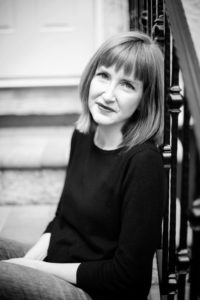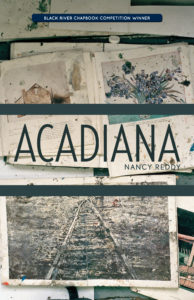Acadiana, Black Lawrence Press, 2018.
Synopsis: These poems, set in south Louisiana just before and in the immediate aftermath of a hurricane, examine the use of religion and ritual as consolation in the face of disaster.
What makes this chapbook a “project book”?
The unifying thread here is landscape and the figures moving through that landscape, as well as a fairly compressed time frame. There’s a kind of cast of characters here–the sibyls, oracular figures who act as a kind of Greek chorus, commenting on the action and alternating between guiding and scolding the townspeople; a siren, who finds herself beloved and then abandoned by a god; girls who live in town and find their lives transformed by the hurricane; and a handful of saints who wander between swamp and town.
Why this subject (or constraint)?
When I graduated from college, I moved from Pittsburgh to New Orleans to teach high school English in an Orleans Parish public school, and when Hurricane Katrina happened in my second year of teaching, my students and I were all displaced. Our school building was totally destroyed by flood waters, and the students I was able to get in touch with were scattered around New Orleans and Texas. I ended up living and teaching in Houston for several years after that, and New Orleans has remained a really special place to me. I wanted to write about my students and that experience of disaster for a long time, but I felt like–especially as a middle class white woman, someone not from New Orleans, someone for whom the loss of New Orleans was sad but not a total devastation–the particular story of Katrina wasn’t mine to tell.
So, rather than writing explicitly Katrina poems, these poems attempt to evoke the sense I always had, driving on I-10 across the bayous and on the Twinspan across Lake Pontchartrain, of south Louisiana as a kind of liminal space, a landscape where saints and sirens and sibyls might walk among the fishing houses and the cypress.
Was your project defined before you started writing? To what degree did it develop organically as you added poems?
The chapbook really developed as a happy accident of the incredible time I had during the summer between the first and second years of my MFA. At that point, I didn’t really have a handle on what I wanted my thesis to be, so I was just trying to write and write. I had a tiny little library carrel, with a kind of wire mesh door and a little cobwebby window, and every day I’d take the bus to campus and shut myself in with my notebook and a thermos of coffee. It sounds a little grim, maybe, but those were among the happiest weeks of writing I’ve had. I started with a kind of cast of characters (the sibyls, who serve as gatekeepers to the swamp, were probably the first to emerge), and every day I’d visit them and make notes about where to explore next. As the poems took shape I was able to make myself assignments about what and who to write next.
When that summer finished, though, I was trying to find a way to jam those poems in with the rest of my MFA thesis, and ultimately they just didn’t fit. (The other poems–or about half of them, after post-graduation writing and revisions–went on to become my first full-length collection, Double Jinx.) So I sent these swampy poems out individually for a while, and in the Fall of 2016 I realized most of them had been published, and I wanted to see where they could go as a chapbook-length collection. I was very lucky to have Black Lawrence pick them up in my first round of submissions.
How important was it for you that each poem could “stand on its own” or that the poems should rely on other poems in the collection?
Many of the poems were published individually, but I also think that they gain something from being seen all together. There are two poems, for example, that follow a set of sisters, the Thibodeaux girls, before and after the hurricane. They were published in different magazines at different times, and I do think each one stands on its own, but I like having them together in the chapbook so the reader can see how the girls change with this disaster. Radar and Connotation Press’s A Poetry Congeries both published several poems together, and I was happy to have those poems out in the world as a set. (And, as a reader, I really love magazines that publish several poems by a poet at the same time–I like getting to see how different strands of a poet’s work fit together.)
As a reader, are you drawn to project books? What project books have influenced you or have you enjoyed, and what do you think makes those books successful?
Although I admit to having some residual ambivalence about the term “project book,” I love books that feel like they’re developing a coherent world. I’m not sure that she’d call it a project book, but Lauren Berry’s The Lifting Dress feels to me like one example of that kind of work–there’s a coherent landscape, characters that return and evolve, a kind of elusive and elliptical plot of sorts.
What effect do you think the prevalence of project books is having on poetry in general?
I’ll admit that I’m not sure how most poets use the term “project book” at the moment–when I was in my MFA from 2009-2011, I felt like the term was used with some slight scorn, though I think that’s changed. But I do think there’s real pressure now to say what a book is “about”–which is probably more a marketing issue than a poetry issue. That’s interesting to me because it runs so counter to the training most poets get in workshop, where we’re typically forbidden from talking about our work, and the whole idea is that the poem is the thing and the reader will make of it what they will. Then when the poems become a book, your press sends you a marketing questionnaire, and you’re writing jacket copy and trying to explain your work. I find that very disorienting. But I also think that, in order to be advocates for our own work and others’, poets need to be more articulate about the work of the poems or the book, so that’s something I’m working on.
After completing a project, how did you transition into writing something new? What are you working on now? Another project?
Starting a second full-length in earnest was really hard for me. A lot changed about my life between the time that Double Jinx won the National Poetry Series and its publication–I finished a PhD, had a second baby, moved across the country for a new job–and by the time I could sit down again and really think about what I wanted to write in a new book, I felt like I’d forgotten anything I’d ever known about writing a poem, much less a whole new book. I was really lucky that summer to be awarded a Walter E. Dakin Fellowship to Sewanee, where I met a bunch of really amazing poets who were in a similar spot–beginning or, in some cases, finishing, a second collection. (And several of those poets’ second books are on their way into the world–Susannah Nevison’s Lethal Theater, Tyler Mills’s Hawk Parable, and I understand that Jenny Molberg has good news about a second book that she’ll share sometime soon.)
What advice can you offer other writers, particularly emerging writers or poetry students who may be using the project book as a guiding principle for their own work?
One of the risks of project books is becoming too narrow. I think even a book that has a clear, tight theme or subject needs at least a few poems that push against the boundaries of the project. I’ve thought often of the advice my friend Rebecca Dunham gave another friend, Brittany Cavallaro, as Cavallaro was working on her forthcoming book, Unhistorical. In an early stage, Unhistorical had poems that centered on two subjects, and Rebecca said there needed to be a third thing–something to kind of mess up the neatness of the structure. So I think about that now as I’m working on finishing a second full-length collection: what are the central subjects of this book, and where can I push against the constraints I’ve created for myself?



